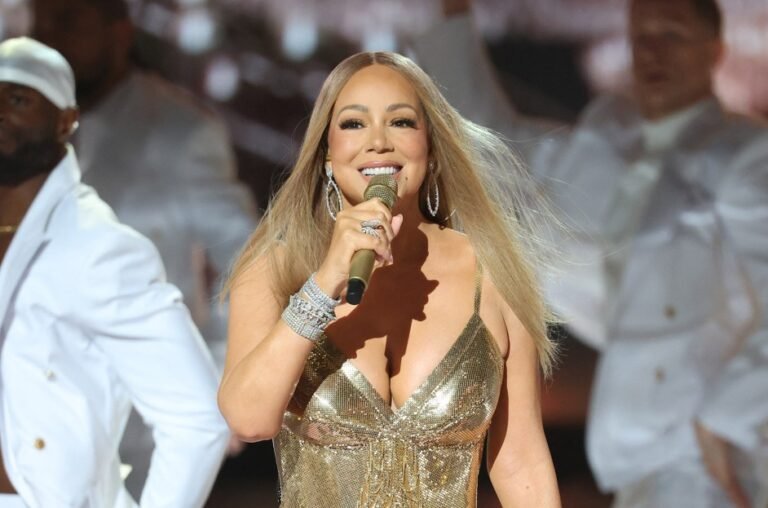Mariah Carey Says Ex-Husband Tommy Mottola ‘Shot Down’ Early R&B Vision: ‘He Didn’t Want Me Making That Music’….see more…
In a revealing new interview, music icon Mariah Carey opened up about the early struggles she faced trying to express her authentic musical identity, claiming that her ex-husband and former Sony Music executive Tommy Mottola discouraged her from embracing R&B during the beginning of her career.
Speaking candidly during a segment aired Tuesday on The Mixdown, Carey reflected on how her earliest efforts to record and release R&B-influenced tracks were rejected or dismissed by Mottola, who was then both her husband and the powerful head of Columbia Records, a division of Sony.
“I wanted to make R&B from the very start,” Carey said. “That was the music I loved. But Tommy didn’t want me making that music. He had a vision of me as this pristine pop princess, and anything that strayed from that was met with resistance. He shot down so many of my early ideas.”
Carey, now 55, went on to describe what she called a “creative prison” in her formative years, where her artistic instincts clashed with the commercial expectations imposed upon her. “There were entire demos that I had shelved. I worked with producers who helped me find my voice, but those sessions would just disappear—nobody from the label wanted to hear it.”
This isn’t the first time Carey has spoken about her turbulent relationship with Mottola, whom she married in 1993 and divorced in 1998. However, the new revelations provide deeper insight into how that relationship directly affected the trajectory of her sound in the 1990s—especially as the R&B and hip-hop genres were ascending in mainstream popularity.
“When I look back, it’s heartbreaking because there was so much I could’ve done earlier. I loved artists like Mary J. Blige, Faith Evans, Aaliyah… I was writing with that influence in mind, but being told it wasn’t ‘marketable’ for me,” Carey continued. “There’s this misconception that I only discovered R&B later on—but the truth is, it was always there.”
Despite the resistance she faced early on, Carey would eventually infuse more hip-hop and R&B into her sound, particularly starting with her 1997 album Butterfly. Widely considered a turning point in her career, the record featured collaborations with artists such as Puff Daddy, Missy Elliott, and Bone Thugs-n-Harmony, and is often praised for its bold embrace of R&B and hip-hop fusion.
“That album was liberation,” Carey said. “It was the first time I really felt like I had a say. I wasn’t hiding who I was anymore.”
Carey also noted how working with producers like Jermaine Dupri and DJ Clue became critical in helping her bridge pop with R&B. “They gave me space to experiment. I could finally blend genres, write from my heart, and make music that didn’t fit neatly into one box. And the fans responded. They were ready for it.”
Indeed, Butterfly marked the beginning of Carey’s deep-rooted place in hip-hop and R&B circles. The record’s lead single, “Honey,” debuted at No. 1 on the Billboard Hot 100 and was accompanied by a sleek video that signaled Carey’s evolution in style, sound, and image.
Industry experts say Carey’s pivot in the late ’90s was not only a personal triumph but also a reflection of the wider shifts happening in the music world. “Mariah was one of the first major pop stars to truly integrate hip-hop into mainstream pop without it feeling like appropriation,” said Sylvia Rhodes, senior editor at Urban Beat Weekly. “She brought authenticity and respect to those collaborations.”
Today, Carey’s influence on the blending of genres is widely recognized. Artists such as Beyoncé, Rihanna, and Ariana Grande have all cited her as an inspiration—not just vocally, but for her fearless control over her creative direction.
Still, Carey said it took years to shake the control she felt under Mottola. “There were times I felt invisible,” she admitted. “Like my ideas didn’t matter. But you learn. You find your people, your voice, and you trust it.”
Mottola, who has previously denied allegations of controlling behavior, has not yet publicly responded to Carey’s latest remarks. In past interviews, he has acknowledged that their professional relationship was “intense” but said that he “always believed in her talent.”
Carey, meanwhile, is using this chapter of her life to reflect and empower other artists. “I tell young women now: you don’t have to compromise your sound, your roots, or your story for someone else’s agenda. Stand your ground. If you want to make R&B, make R&B. Your truth is your power.”
In addition to her interview, Carey also teased a deluxe vinyl reissue of Butterfly, due out this fall, complete with unreleased demos and remixes from her early R&B sessions—many of which were reportedly shelved during her marriage to Mottola.
“I’m finally sharing what I couldn’t share then,” Carey said. “It’s emotional, but it’s healing. That girl back then—she just wanted to be heard. And now she will be.”
As Carey continues to celebrate her legacy, fans and critics alike are revisiting her discography with new appreciation, understanding how much of her sound was hard-won in the face of industry control. And while the struggle for creative autonomy remains a theme for many artists today, Carey’s journey offers a powerful reminder of what can happen when an artist breaks free.
“It was never just about the notes,” she said in closing. “It was about the soul behind them. And now
, that soul is finally out in the open.”



